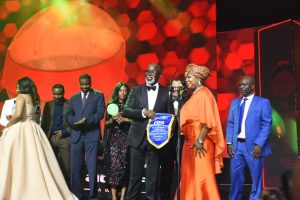From 2014 to 2022, Amaju Melvin Pinnick served as president of the Nigeria Football Federation (NFF), a tenure that promised to elevate Nigerian football to new heights. Pinnick, a charismatic and politically astute administrator, came to power with a reputation for revitalizing the Delta State Football Association. His vision was bold: modernize the NFF, secure corporate sponsorships, and restore Nigeria’s dominance in African and global football. Yet, by the end of his presidency, Nigerian football was mired in missed qualifications, stalled infrastructure projects, and persistent corruption allegations. While Pinnick’s era was marked by flashy events, curated media appearances, and high-profile deals like the Super Eagles’ Nike kit, these efforts often served as a veneer to mask deeper systemic failures.
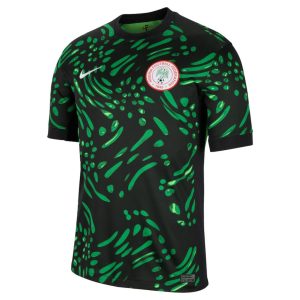
The iconic Super Eagles jersey, perhaps Amaju Pinnick’s only achievement after two terms as NFF President
Missed Qualifications and On-Field Struggles
Under Pinnick’s leadership, Nigeria’s national teams suffered a series of embarrassing setbacks. The Super Eagles, historically a powerhouse in African football, failed to qualify for the 2015 Africa Cup of Nations (AFCON), a significant blow to national pride. The team also missed out on the 2020 Tokyo Olympic Games football tournaments, alongside the women’s team, the Super Falcons. Nigeria’s youth teams fared no better, with the Golden Eaglets and Flying Eagles exiting in the round of 16 at their respective 2019 World Cup tournaments. The locally-based CHAN Eagles failed to qualify for the 2020 African Nations Championship and suffered an early exit from the regional Wafu Cup. Most painfully, the Super Eagles missed the 2022 FIFA World Cup after losing to Ghana in the playoffs, a failure that sparked widespread outrage among fans.
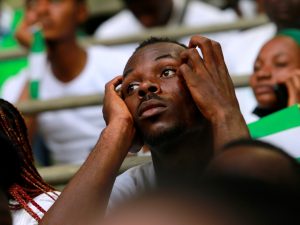
Pinnick often attributed these failures to external factors, particularly ongoing corruption investigations that he claimed disrupted the NFF’s operations. In 2019, he issued a 15-page statement blaming funding shortages and a “toxic environment” caused by probes from anti-corruption agencies like the Economic and Financial Crimes Commission (EFCC) and the Independent Corrupt Practices Commission (ICPC). However, critics argued that these were convenient excuses for poor planning, mismanagement, and a lack of focus on grassroots development. The Super Falcons, despite winning the 2018 AWCON, struggled with unpaid bonuses and allowances, leading to player protests and a decline in morale. The absence of consistent coaching and strategic investment in women’s and youth football further compounded these failures.
Stalled Projects and Infrastructure Decay
Pinnick’s administration promised transformative infrastructure projects to bolster Nigerian football. Plans for modern stadiums, training facilities, and youth academies were announced with fanfare, but many remained unfulfilled. The Federation Cup, one of Nigeria’s most historic tournaments, lost its prestige under Pinnick, with declining fan interest and organizational neglect. The Nigeria Professional Football League (NPFL) stagnated, plagued by poor funding, unpaid salaries, and a lack of television coverage. In 2022, a court declared the League Management Company illegal, leaving the league’s future uncertain.
Pinnick’s ambitious goal of making the NFF self-funding through private-sector partnerships achieved partial success, with 65% of the NFF’s budget reportedly coming from sponsors like Nike, Aiteo, and Zenith Bank by 2018. However, these funds rarely translated into tangible improvements. Key infrastructure projects, such as a proposed massive stadium in Warri and eight practice pitches in Lagos, remained in the planning stages. Pinnick himself acknowledged Nigeria’s infrastructural deficits, noting in 2024 that the country lacked functional stadiums and maintenance culture compared to nations like Morocco. Yet, during his tenure, little progress was made to address these issues, leaving Nigerian football reliant on outdated facilities like the Abuja National Stadium.
Corruption Allegations and Legal Battles
Corruption allegations dogged Pinnick’s presidency, casting a shadow over his achievements. In 2019, Pinnick and four other NFF officials were charged with misappropriating $8.4 million in FIFA funds intended for Nigeria’s 2014 World Cup participation. The Special Presidential Investigation Panel (SPIP) also accused them of failing to declare assets and arranging fictitious friendly matches. While the federal government withdrew these charges in November 2019, citing insufficient evidence, the EFCC and ICPC continued separate investigations. The ICPC seized properties belonging to Pinnick and other officials, including a London property, amid claims that their wealth exceeded their legitimate earnings.
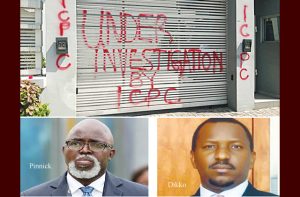
The long arm of the law: Amaju Pinnick was constantly on the radar over corruption and embezzlement
In 2018, Harrison Jalla, former president of the National Association of Nigerian Footballers, petitioned FIFA’s ethics committee, alleging that Pinnick, NFF Secretary-General Mohammed Sanusi, and Second Vice-President Shehu Dikko embezzled funds, including the 2014 World Cup participation fee. Jalla claimed that the NFF used “imaginary financial transactions” to cover up misappropriation and diverted sponsorship funds through a private company, Financial Derivatives, to bypass federal regulations. These allegations were never conclusively resolved, but they fueled perceptions of opacity within the NFF.
The 2018 case of Super Eagles coach Salisu Yusuf, caught on camera accepting $1,000 from an undercover journalist posing as a football agent, further tarnished the NFF’s reputation. Yusuf’s actions, soliciting bribes to select players for the CHAN squad, highlighted a broader culture of corruption that permeated Nigerian football. Former Super Eagles defender Taribo West summed up the sentiment in 2020, declaring, “Nigerian football is sinking, it’s almost dead. There’s almost no place where you can talk out against those managing football because they have paid everybody.”
The Facade of Flashy PR and Superficial Wins
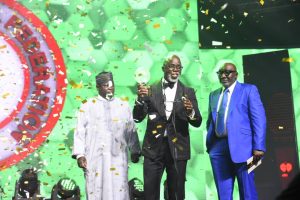
Amid these failures, Pinnick’s administration excelled at projecting success through carefully curated media appearances and high-profile events. The 2018 Super Eagles Nike kit, a global sensation with over three million pre-orders, was a masterstroke of branding. Pinnick’s negotiations with Nike, after rejections from Adidas and Puma, secured a deal that elevated Nigeria’s international image. However, the kit’s success was more about aesthetics than substance, doing little to address the structural issues plaguing the sport.
Expensive events, such as international friendlies and lavish ceremonies, were organized to maintain public optimism. Pinnick’s media-savvy approach ensured positive coverage, with frequent appearances on platforms like Channels TV and ARISE News, where he promised imminent breakthroughs. His appointment to the FIFA Council in 2021 and brief tenure as CAF First Vice-President were touted as evidence of Nigeria’s growing influence in global football. Yet, these personal accolades contrasted sharply with the NFF’s domestic struggles.
Piecemeal interventions, such as the appointment of high-profile coaches like Gernot Rohr and Sunday Oliseh, were sold as game-changers but often ended in disappointment. Oliseh’s tenure, hyped as the arrival of an “African Guardiola,” collapsed amid unpaid salaries and internal conflicts. Rohr, who qualified Nigeria for the 2018 World Cup, was sacked at a critical juncture, a decision critics attributed to Pinnick’s preference for optics over stability. The NFF’s focus on the Super Eagles as a “shiny ornament” neglected the broader ecosystem, including women’s football, youth development, and the domestic league.
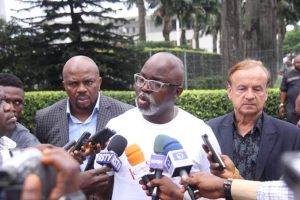
Legacy of Unfulfilled Promise
Amaju Pinnick’s presidency was a paradox: a blend of negligible achievements and spectacular failures. His ability to secure sponsorships, elevate Nigeria’s global profile, and navigate the politics of international football was commendable. However, these successes were overshadowed by missed qualifications, stalled projects, and persistent corruption allegations. The NFF’s reliance on PR-driven distractions—flashy kits, expensive events, and curated narratives—could not mask the rot within Nigerian football.
As Pinnick himself admitted in 2024, Nigeria needs better infrastructure, professional management, and strategic planning to compete globally. Yet, during his eight years at the helm, these goals remained elusive. The collapse of Nigerian football under his watch serves as a cautionary tale: no amount of media spin can substitute for transparency, accountability, and a genuine commitment to development. For Nigerian football to rise again, future leaders must prioritize substance over spectacle, ensuring that the passion of millions of fans is matched by a system that delivers results.
